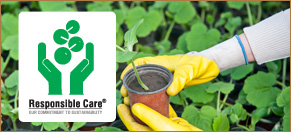


The Twelfth Edition of ICC's mega event - the "12TH ANNUAL INDIA CHEMICAL INDUSTRY OUTLOOK CONFERENCE" was organised in Mumbai on 7&8 February 2019. The venue of the grand event was Hotel Taj Lands End, Bandra, Mumbai. The theme of the Conference was "Industry 4.0 - Implications for Chemicals Industry - Feedstock, Technology & Global Trade".
Industry 4.0 - The fourth industrial revolution is today's industry buzzword, Industry 4.0 comprises the networking of value chains, the digitisation of products and new business models. It offers the industry to be competitive and substantial improvement in productivity along the value chain thereby improving bottom-line.
The focus of the conference was to bring to the participating delegates the latest in the world of trade commerce and chemicals. The world is experiencing new forms of trade restrictions and many countries may adopt protectionist views in trade policies, China a dominant force in the world of chemical trade, US with shale gas and cheap feedstock source could change the global trade patterns.
Oil prices have remained turbulent and a stable oil price regime looks a distant dream. Disruptive technologies continue to bring in new dimension to the complexities of the industry. Amidst this chaos, speciality chemical industry continue to show robust growth. Environment and stricter norms to protect are keeping the industry on its toes and newer methods are being adopted to align with the new requirements.
Sustainability and circular economy will continue to be ever important part of Chemical Industry.
This edition of the conference brought to fore all these aspects and many more. This conference has endeavoured to be the best platform for industry interaction on the latest in the world of chemical industry and networking with experts of the field.
The 12th Annual event was organised in collaboration with Department of International Trade, U.K. and with the support of Department of Chemicals & Petrochemicals, Government of India. As was the previous years, McKinsey & Company has actively participated being the event's Knowledge Partner.
The Two-day event started with the Opening Remarks by Mr. Kamal P. Nanavaty, Chairman, Conference & Exhibitions Committee of ICC (President, Strategy Development, Reliance Industries Ltd.).
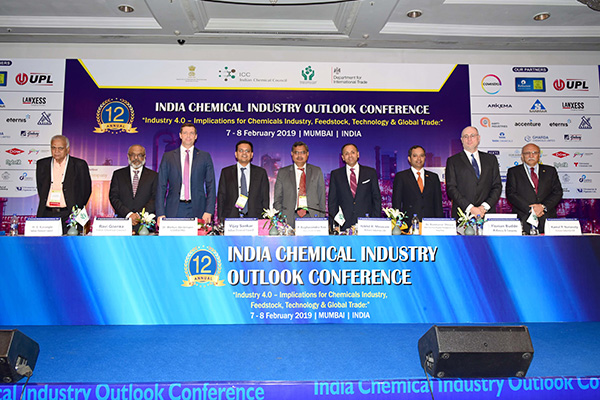
The Inaugural Line up (From L to R) are: MR. H.S. KARNAGLE, Director General-ICC; MR. RAVI GOENKA, Vice President-ICC, MR. MARKUS STEILEMANN, CEO-Covestro (Keynote Speaker); MR. VIJAY SANKAR, President-ICC; MR. P. RAGHAVENDRA RAO, IAS, Secretary-DCPC, Govt.of India (CHIEF GUEST); MR. NIKHIL MESWANI, Executive Director-Reliance Industries Ltd (Keynote Speaker); DR. RAMKUMAR DHURVA, President-BASF East Asia Regional HQ, Hong Kong (Keynote Speaker); MR. FLORIAN BUDDE, Senior Partner -McKinsey & Company (Keynote Speaker) and MR. KAMAL NANAVATY, Chairman-Conference & Exhibitons Committee, ICC.
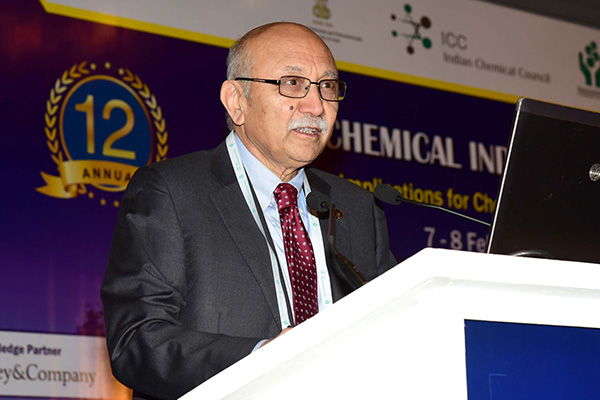
MR. KAMAL NANAVATY, CHAIRMANCONFERENCE & EXHIBITIONS COMMITTEE OF ICC MAKING THE OPENING REMARKS
In his address Mr. Kamal Nanavaty, said that India imported $19-bn worth of chemicals listed under Chapter 29 of the Harmonised Tariff codes. In the first nine months of the year, this figure has already reached $15-bn and is all set to surpass that level for the current fiscal. "For the Indian chemical industry this is an opportunity to substitute for imports by developing technology & knowhow, and operating at economies of scale."
Mr. Nanavaty urged the industry to emulate China, which through a series of investments in new capacity, has raised the country's level of self-sufficiency from 5% of petrochemical products in 2010 to 75% in 2015.
China consumes over one-third of global demand for chemicals and petrochemicals and remains the main driver of chemical demand in the world. Its leadership is expected to continue, leading to 40% global market share and 70% Asia-Pacific market share by 2020. A wave of refinery and petrochemical capacity additions is ongoing – a majority of which are integrated projects with sound economics. Capacity for ethylene, for example it is expected to more than double in five years, while benzene capacity is expected to rise to account for half of total Asian capacity by 2021.
TABLE 1: CHEMICAL CAPACITY, 2017 (KTPA)
| CHEMICAL | INDIA | CHINA | FACTOR |
| Methanol | 276 | 76,740 | 278 |
| Acetic acid | 165 | 8,310 | 50 |
| Benzene | 1,990 | 16,980 | 9 |
| Styrene | 0 | 8,265 | NA |
| Toluene & benzene | 2,251 | 16,427 | 7 |
| Phenol | 57 | 2,423 | 43 |
| Cumene | 76 | 2,933 | 39 |
| Vinyl acetate monomer | 0 | 3,040 | NA |
| Ethylene vinyl acetate copolymer | 0 | 712 | NA |
| Methylene diiosicyanate (MDI) | 0 | 2,970 | NA |
| Toluen diisocyanate (TDI) | 61 | 870 | 14 |
| Ethylene oxide & monoethylene glycol | 1,250 | 8,030 | 6 |
| Propylene oxide | 36 | 3,042 | 85 |
SOURCE: ICIS
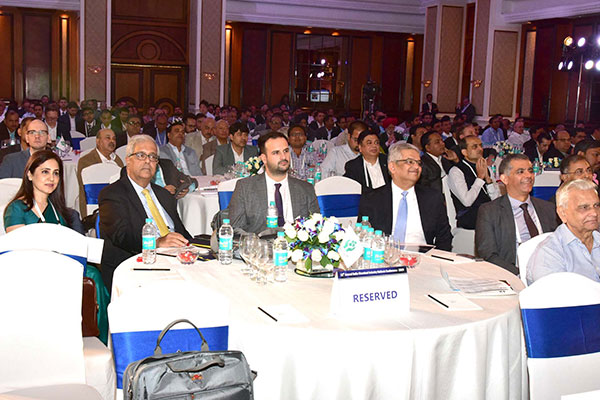
A PART VIEW OF THE DELEGATES
Mr. Vijay Sankar, President, ICC, in his Welcome Address, called for a stable policy regime to encourage investments in the basic chemical industry here in India, wherein imports represent a great opportunity, as well as faster environmental clearance to drive growth in the speciality chemical industries.
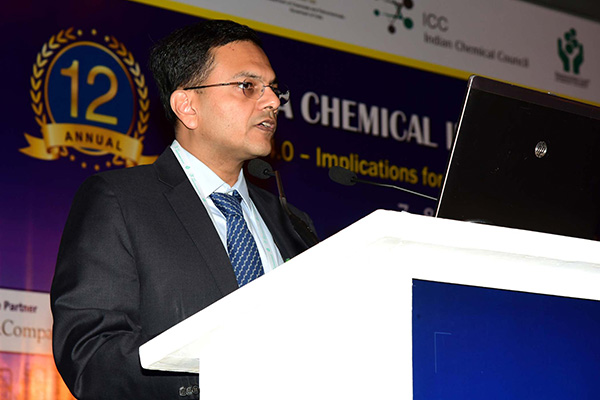
MR. VIJAY SANKAR, PRESIDENT-ICC, DELIVERING THE WELCOME ADDRESS
According to Mr. Vijay Sankar, India has moved to a very low tariff regime for basic chemicals, which has benefitted international companies who have not cared to invest in the country. "The current tariffs are too low in the context of Free Trade Agreements (FTAs), and the response of the government to trade aberrations is also slow," he noted.
While companies in the business of speciality chemicals will benefit from faster environmental clearances, especially in the context of the developments in China, he stressed the need for companies need to transform their attitude to environmental norms and sustainability. "One snafu will have repercussions far beyond the company concerned," Mr. Vijay Sankar warned.
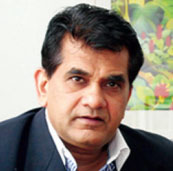
Mr. Amitabh Kant, IAS, CEO - NITI Aayog, who could not attend the function as Chief Guest due to some suddenly called meeting at New Delhi, was kind enough to send a Video Message which was played for the benefit of the gathering
Mr. Amitabh Kant, in his message, opined that the Indian chemical industry underrepresented in chemical demand and 50% of niche petrochemical intermediates are imported. "Can we aspire to 15-20% growth to become the third largest chemical industry by 2025? We need greater value chain capture and increase self-sufficiency; need to achieve functional excellence by adopting Industry 4.0; and the focus on sustainable solutions," he added.
Mr. Kant also stressed the importance of up-scaling human skills and generating employment.
INDIAN CHEMICAL INDUSTRY SET TO GROW EVEN AS GLOBAL INDUSTRY FACES UNCERTAIN PROSPECTS:
In last 15 years shareholders in the chemical industry had a party, as the industry outperformed the market as a whole and several other industries including its customers. This happened because the industry came out of a major restructuring that lead to a relatively concentrated structure, with improved margins and profitability for players. The improvement in profitability came to a stop around 2011 due the entry of several Chinese suppliers in the market, which took competition to a level of intensity not seen earlier.
Over the last five years, the Total Return to Shareholders (TRS) in the global chemical industry has been growing at about 11%, with commodity chemical players posting 11% growth and speciality chemical companies 16%. Diversified chemical companies have been lagging behind the industry as a whole in terms of TRS, at 10%, slightly worse than the 11% return seen in the markets as a whole.
Dr. Florian Budde, Senior Partner, McKinsey & Company, delivering the Keynote Address on "The Global Trends in the Chemical Industry" said that the global chemicals growth may be slowing down as emerging markets mature and due to decreasing 'intensity' of chemical consumption, in relation to GDP, from about 1.3 to 1.1. "Globally, GDP growth will slow down and could even go down to a small extent, depending on what happens in China,"Dr. Budde observed.
OPPORTUNITIES IN INDIA:
Among all uncertainties facing the global industry, India remains an island of happiness - with strong growth albeit on a small base. Indian chemical companies have outperformed their global counterparts, providing TRS of ~22% (Jan 2012 to Jun 2018), compared to ~11% for their global peers, but the country remains a net importer of 80+ chemical intermediates across the C1-C8 value chains. "Increasing regionalisation of trade will improve the case for local capacity additions in India," Dr. Budde noted.

MR. FLORIAN BUDDE DELIVERING THE KEY NOTE ADDRESS
LESSER NEED FOR NEW CAPACITY:
According to McKinsey's analysis, demand destruction on virgin polymer demand due regulation and the capacity creep expected as existing manufacturing units debottleneck and expand, will suffice to meet emerging demand. "The need for new capacity for polymers will be relatively modest at a global level, though in countries like India and China this may not be the case. In some aggressive scenarios there is even a decline in demand for virgin materials. Depending on how regulations go, we may experience very different scenarios," Dr. Budde added.
Dr. Budde noted while the current digital wave is about three years old now, there is a consensus building in the industry that there will be no major disruption due this till the medium - to long-term. "We have not yet seen new business models, though several are being tried out. The agrochemicals industry is, however, a different universe, and has seen some disruptions," he noted. The major impact of digital technologies is likely to be on improving functional excellence
One thing, however, is near certain: significantly lower new capacity will be needed to meet global polymer demand; and the historical correlations between GDP growth and polymer demand may not be valid in the future. Recycling technologies – mechanical, chemical and pyrolysis – will grow exponentially
"Challenging World - Corporate Management in the Era of Sustainability and Digitalization" was the theme of the Keynote Address delivered by Dr. Markus Steilemann, CEO, Covestro. He concurred that while plastics will be part of the materials of the 21st century, the growth rate for virgin plastics will be on the lower side. Dr. Steilemann stressed the need to establish holistic circular systems to tackle the problem of plastic waste. "The chemical industry must embark on sustainability initiatives immediately. We need to run carbon in circles - there is no need for additional carbon."
According to Dr. Markus Steilemann, CEO, Covestro, the chemical industry has yet to embrace digitalisation as some other industries have. "Whatever can be done digitally, must be done so at maximum speed. It is important to start with the customer, and provide several touch-points for all his requirements through a multichannel approach. Make use of big data in R&D and to step up efficiency and safety of manufacturing systems," he noted.
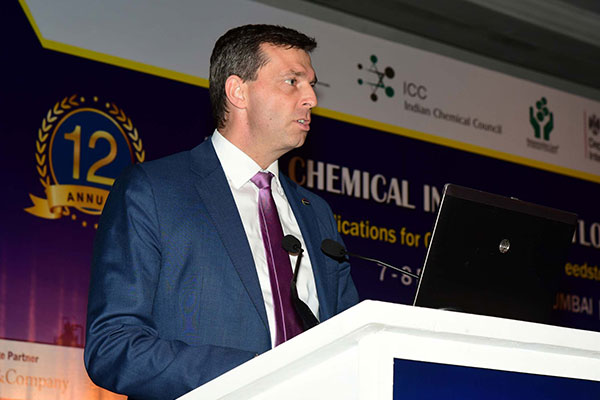
DR. MARKUS STEILEMANN MAKING KEY NOTE
ADDRESS
Mr. Steilemann termed the recently formed Alliance to End Plastics Waste "as a significant step in addressing the plastic waste issue" and said that it deserves broad support.
Delivering his Keynote Address on "Vision for the Global Chemical Industry", Dr. Ramkumar Dhruva, President, BASF East Asia Regional Headquarters, Hong Kong, outlined BASF's ambitious carbon-neutral growth strategy until 2030. This will be made possible by improving energy and operational efficiency; integrating renewable energy into production; and through the development of new, breakthrough technologies.
These initiatives will likely be showcased at the recently announced €2-bn investment plan in the acrylics value chain at Mundra (Gujarat) in a joint venture with the Adani Group. The project – BASF's largest to-date in India – will be 100% powered by renewable energy, for which BASF will invest in wind and solar parks for the first time ever.
Among other sustainability initiatives, BASF's agrochemicals business is working with partners to expand usage of drones for spraying. "This has the potential to reduce consumption of agrochemicals by up to 30%," Dr. Dhruva added.
Mr. Nikhil R. Meswani, Executive Director, Reliance Industries Ltd., delivering his Keynote Address on "Transformative Change: A Necessity for Current and Future Success" noted that in India currently about 10% of plastic waste is recycled, though the figures are much higher for some polymers. In the case of polyethylene terephthalate (PET), for example, recycling rates are already 75% and expected to cross 90% by 2020. Reliance alone recycles 2-bn PET bottles, employing 3 lakh people in the whole value chain, and the repurposed resins are used for making fibres and fibre-fill.

DR. RAMKUMAR DHRUVA DELIVERING THE KEYNOTE ADDRESS
Electric vehicles, Mr. Meswani felt, will provide many new opportunities for polymers, and drive the conversion of oil to chemicals, instead of fuels. "The adoption of electric vehicles will be faster than most people expect – impacting markets for polymers, materials etc.," he added.
Mr. Meswani added that the advent of electric vehicles would change the way cars are built in the future and challenge traditional refining businesses that produce fuels that may not have much demand. "New avenues of growth will be needed such as oil to chemicals," he added. American exporters who may see their plans to export shale gas based polymer capacity not work are likely to be the most affected. As of August 23, 2018 imports of HDPE and LLDPE from the US are subject to additional 25% tariffs.

MR. P. RAGHAVENDRA RAO, IAS, SECRETARY – DCPC, GOVT. OF INDIA, WHO WAS THE CHIEF GUEST, ADDRESSING THE DELEGATES.
Mr. Meswani warned that US chemical exports destined for China will need to find new homes, and India needs to be cautious. On the positive side, he noted that China will shed labour-intensive manufacturing that could migrate to India, amongst other countries.
Mr. P. Raghavendra Rao, Secretary, Department of Chemicals and Petrochemicals, Government of India, who graced the occasion as Chief Guest, called for measures to ensure that prosperity is shared with as many as possible. "We need to ponder over the idea whether growth without jobs is a good thing," he observed.
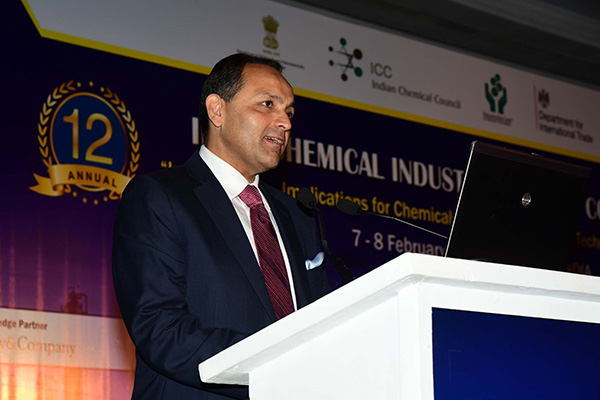
MR. NIKHIL MESWANI, KEYNOTE SPEAKER ADDRESSING THE DELEGATES
Mr. Rao assured the industry that Government initiatives would continue to contribute to the growth of the chemical industry in the country.
He also solicited inputs from the industry for preparing Chemical Policy as well as feedback for preparing Blue Print for Chemical Industry Vision for the year 2025.
The Inaugural Session of the 2-day event concluded with the customary Vote of Thanks by Mr. Ravi Goenka, Vice President – ICC (Managing Director, Laxmi Organic Industries Ltd.).
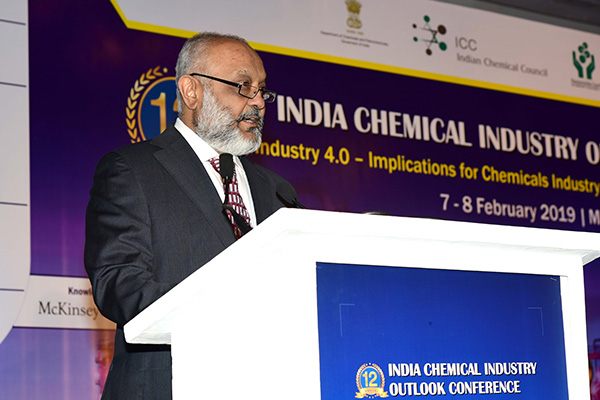
MR. RAVI GOENKA, VICE PRESIDENT-ICC PROPOSING VOTE OF THANKS
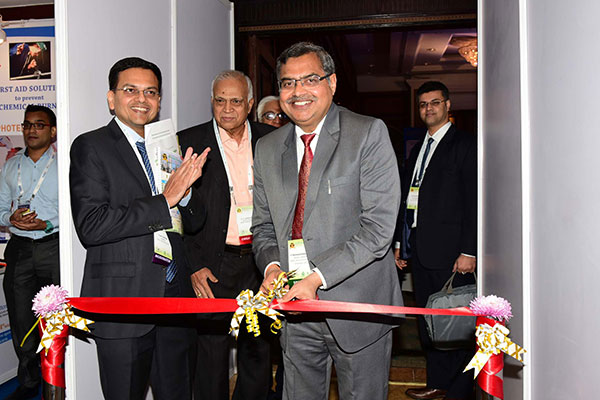
INAUGURATION OF THE EXHIBITION
In collaboration with Eliteplus, ICC's event managers, a mini exhibition was also arranged on the sidelines of the 12th edition of the Annual India Chemical Industry Outlook Conference. This enabled to successfully attract relevant, senior-level decision makers across all areas of the Chemical industry, providing the exhibitors with a perfect platform to engage with new prospects, bolster brand awareness and generate new leads. It also established a platform for leaders of private sector companies, public sector units, government bodies, industry experts and investors to interact on these opportunities.
Raw Material Suppliers, Catalyst Suppliers, Equipment Suppliers, Lab Services, Process Licensors, and Allied Services: Water, Power, Insurance, banking & Instrumentation, IT- Digitization, Logistics & Storage, Consultants, Market Research & Data Resource Companies were amongst the exhibitors.
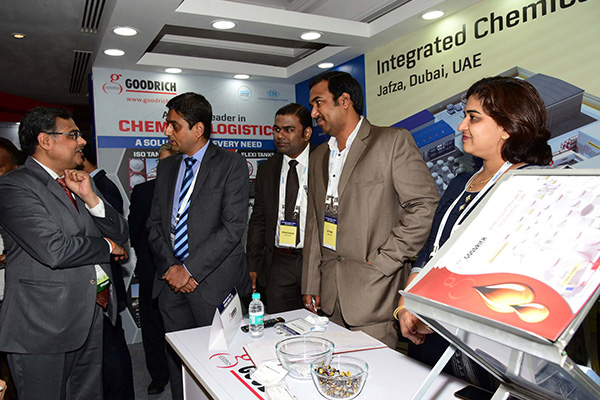
AT THE EXHIBITION STALLS
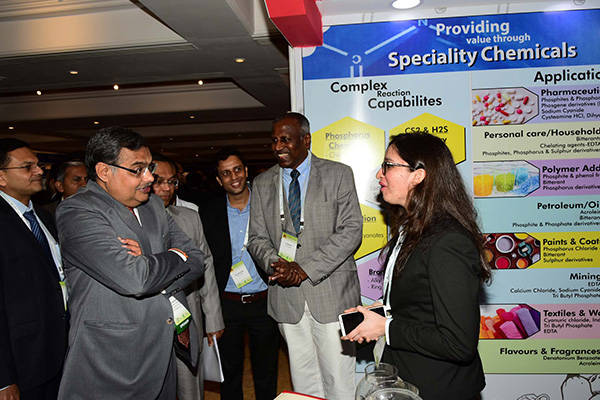
Please click here to view 12TH ANNUAL INDIA OUTLOOK CONFERENCE Report
